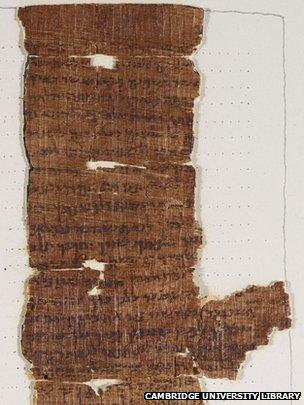10 Commandments digitised by University of Cambridge
- Published

The Nash Papyrus is one of thousands of historical texts that have been placed online
A 2,000-year-old copy of the 10 Commandments and other key religious manuscripts have been digitised and put online by the University of Cambridge.
The fragile Nash Papyrus, as it is known, is one of the oldest manuscripts containing text from the Hebrew Bible.
Other uploaded pieces include the 10th Century Book of Deer, believed to be the oldest surviving Scottish script.
The university said it had now uploaded a total of 25,000 new images online for people to view around the world.
Unveiled last December, the Cambridge Digital Library began after a £1.5m donation from the Polonsky Foundation and has since attracted tens of millions of hits on its website.
New digitised works include The Life of Edward the Confessor, which provides an account of the early English saint and king and is said to be a "masterpiece" of 13th Century English illumination and political propaganda.
The library is also releasing digital versions of its Islamic and Sanskrit collections, which include some of the earliest surviving Korans, and an extensive Cairo Genizah anthology providing glimpses into the life of Jews in Egypt over a period of 1,000 years.
University librarian Anne Jarvis said: "Cambridge University Library preserves works of great importance to faith traditions and communities around the world.
"Because of their age and delicacy these manuscripts are seldom able to be viewed - and when they are displayed, we can only show one or two pages.
"Now anyone with a connection to the internet can select a work of interest, turn to any page of the manuscript and explore it in extraordinary detail."
- Published12 December 2011
- Published19 September 2011
- Published4 June 2010